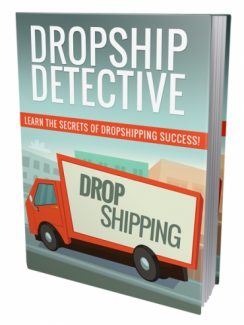 License Type: Personal Use
License Type: Personal Use  File Type: ZIP
File Type: ZIP
 SKU: 59388
SKU: 59388  Shipping: Online Download
Shipping: Online Download
Ebook Sample Content Preview:
Introduction
Starting any type of retail business is never an easy task. It typically requires a large outlay of cash in the beginning to purchase stock, invest in warehouse or store space, and handle initial overhead costs.
With all the other expenses required to start a business, buying stock is often the straw the breaks the camel’s back with regards to finance. It’s often the largest expense of any retail startup, and sometimes it’s just too much and the business fails to get off the ground.
Plus, there’s always the risk that you’ll spend thousands of dollars on products that never sell, and you’ll be out of all that money and stuck with items you can’t get rid of.
But there is a better way!
Instead of spending a fortune upfront on product, and then having to find warehouse space to store it, and figuring out the logistics of packing and shipping it to customers, why not just use dropshipping?
Dropshipping will allow you to get started with little to no upfont investment, while still being able to offer customers the products you want to offer!
In this guide, you’re going to learn the basics of dropshipping, and how to find the best suppliers.
So let’s get started!
Dropship Detective
What Is Dropshipping?
Imagine setting up your own online store with dozens, hundreds, even thousands of products without having to spend a single dime upfront on inventory.
Instead, you find products on another website (let’s use Amazon in this example since most people are familiar with it), add products to your site, and price them higher than they are being sold on the original size (Amazon).
Let’s say you are selling a frying pan that sells for $14 on Amazon. You price it at $20 on your website. When a customer orders it, they pay you $20. Then you go to Amazon and order it for $14, having Amazon ship it directly to the customer, and you keep the $6 difference.
Pretty slick, right?
Only dropshipping doesn’t require you to pay full retail price like ordering from Amazon. Instead, you can often get prices that aren’t all that much higher than true wholesale prices.
Of course, you have to be careful. Some so-called dropshipping companies are actually selling at or very near retail, so it’s nearly impossible to make a profit. Sometimes they charge a monthly or yearly fee to access their inventory, which cuts into your potential profits even further.
You also have to make sure the company isn’t going to be slow with shipping, which could seriously harm your reputation.
Dropship Detective
Dropshipping has a lot of pros and cons, so let’s take a look at those before we continue.
Pros Of Dropshipping
Lower Upfront Investment – Because you don’t have to pay for inventory upfront, your initial business startup costs are much lower.
No Warehouse Space Needed – The dropshipper is the one who deals with inventory, so there’s no need to rent a warehouse or take up space in your home to keep your inventory.
No Shipping Hassles – The dropshipping company also handles packaging and shipping products, so that takes a lot of work off your hands, freeing you up for other tasks, like marketing, and sourcing other products.
More Products – If you don’t have to worry about whether a product will sell or not because you aren’t paying for it upfront, you can take more liberties with the products you add to your store. If a product doesn’t sell, the only thing you’ve lost is the small amount of time it took to add it to the store, and you can remove it just as easily.
Cons Of Dropshipping
Low Profit Margins – Because most dropshippers are not true wholesalers, you’ll find your profit margins are lower than they would be if you bought inventory directly from wholesalers. In
Dropship Detective fact, there’s often a middleman between the wholesaler and dropshipper, which cuts into profits even more.
Delivery Issues – Because you will have no direct control over shipping, there may be times when customers don’t get their orders on time, or receive the wrong product or damaged merchandise. Because they bought the item from you, they will expect you to be responsible, and they aren’t likely to accept the fact that you used a dropshipper as an excuse. In fact, they’d likely just see that as a reason not to order from you again.
Inventory Issues – You may also find that your dropshipper’s inventory control system doesn’t sync with your own, which means there may be times when a customer orders a product from your site that is not currently in stock with the dropshipper. In this case, you’d have to either source the product elsewhere very quickly, or issue a refund and an apology to the customer.
Higher Shipping Costs – Because you won’t be able to make deals with shipping companies for volume discounts, and because customers may order products from multiple dropshippers in a single order from your store, you may run into shipping issues. Shipping costs could eat into your profits pretty badly if you aren’t careful.
It’s a tradeoff, really. You sacrifice larger profit margins and control over inventory and shipping for a lower upfront investment and less work overall. It’s up to you to decide if dropshipping is right for you and your business.
How Dropshipping Works
Before you can truly understand how dropshipping works, it’s important to understand the basic supply chain. Products you see in stores often go through three, four, five, or even more companies in the supply chain before they arrive in stores.
Manufacturers
Manufacturers are the first step in the supply chain. (Unless of course you count the companies that supply the raw materials, but that’s a different arm of the supply chain.)
Manufacturers create the products, but most of them don’t sell directly to the general public. Instead, they typically sell through a wholesaler, or sometimes another middleman brokers the sale of the product from the manufacturer to the wholesalers.
Occasionally, manufacturers may sell directly to retailers, but they usually don’t deal with selling direct to companies.
Wholesalers
Wholesalers are middlemen. They buy from the manufacturer and resell at a higher price to retailers. They usually don’t make an enormous profit per item, but they make their money by selling in bulk.
- License: Personal Use
- Category:Ebooks
- Tags:2016 Ebooks Personal Use








